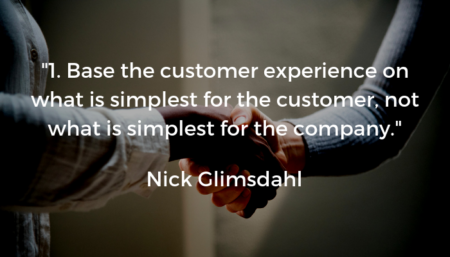This post by Nick Glimsdahl is the companion to an interview with Michelle Harrison, CEO of Kanter Public, the WPP Group public policy consulting and research business, on Voice America where she talks about the first of its kind report that Kantar Public released at Davos focusing on the challenges governments face across the planet and how the current loss of trust impacts their ability to navigate current challenges.
Everyone — including me — is vying for your attention. We live in a noisy world, bombarded by advertisements, news, campaigns, emails, messages, and social media notifications.
So, how can a business build trust and credibility in today’s noisy world?
This deceptively simple, relevant question is up against a distrusting world. In America specifically, the state of trust is dire. The Edelman Trust Barometer’s Executive Summary reports, “It is no exaggeration to state the U.S. has reached a point of crisis that should provoke every leader, in government, business, or civil sector, into urgent action. Inertia is not an option, and neither is silence…no work is more important than re-establishing trust” (p. 7).
Rather than feeling overwhelmed, business leaders should take a strategic approach to build trust and create positive brand awareness to help ensure messages are received. While increasing revenue is vital to a successful business, focusing on revenue without prioritizing content, awareness, and trust is futile. Hence, a company’s first priority should be to make sure customers view its content, marketing, and brand as credible, trustworthy, and customer-centric.
Eight Trust-building actions to weave into a business strategy:
1. Base the customer experience on what is simplest for the customer, not what is simplest for the company
2. Weave technology into the fabric of the business strategy, demonstrating that the business is ‘with the times,’ aware of customer expectations, and able to quickly resolve issues with modern solutions
3. Create effortless, memorable interactions with your customers so they willingly return
4. Seek ways to provide value to others first
5. Ask for and respond to reviews and highlight them on your site
6. Create an online reputation and have a consistent brand
7. Make sure online interactions are secure
8. Have timely coverage of business news
Building a trustworthy brand results in many benefits. In fact, according to Forbes, trust is the most powerful currency in business. Beyond being a currency of its own, trust leads to referrals, stronger collaboration, a stronger business, and the ability to work through challenges internally or with a client.
Building trust requires time — a currency of itself; however, as the most powerful currency, trust requires the utmost attention for a company to reach its highest potential.
As a reader of this blog and listener to the interviews, please consider enrolling in one of the innovative leadership online leader development program. For additional tools, we recommend taking leadership assessments, using the Innovative Leadership Fieldbook and Innovative Leaders Guide to Transforming Organizations, and adding coaching through our online innovative leadership program. We also offer several workshops to help you build these skills.
About the Author
Nick Glimsdahl is the Client Enablement Director for VDS. VDS creates effortless interactions. It helps improve the way enterprising businesses deliver customer experiences. With a 30-year history of delivering results, its success in creating effortless interactions is unmatched. As a client enablement lead, Nick brings his clients the right communications solution: contact centers through (Genesys / Five9), business collaboration (Microsoft Skype) for Business, or enterprise telephony solutions so you can deliver the best customer experience.






